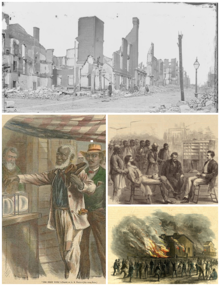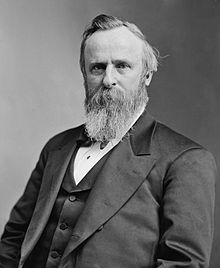Introduction to US History/Reconstruction

| Resource type: this resource contains a lecture or lecture notes. |
Reconstruction was a time period (12 years; 1865 - 1877), when the United States of America was going through a period of "reconstruction", to "construct" back the nation after the deadly Civil War (1861 - 1865), in which the North and South fought against each other, mainly around slavery (but other issues as well). After Reconstruction, the US took another huge change, and we are going to talk about that in this page.
Reconstruction Amendments
[edit | edit source]The "Reconstruction Amendments" are the 13th, 14th, and 15th Amendments to the Constitution of the United States of America. These Amendments have to deal with "Reconstruction" since they "revolve" around Reconstruction issues. The 13th Amendment banned slavery in the US and all of its territories. The 14th Amendment grants citizenship to all persons born in the US and guarantees them equal protection under the law, and the 15th Amendment ensures all citizens the right to vote regardless of race, color, or previous condition of servitude (1).
Reconstruction Policies
[edit | edit source]
During the Reconstruction period, thousands of white Northerners moved to the South. The South lay in destruction and Northern newcomers saw a chance to make a lot of money in the South by taking advantage of the destruction there. The Southerners often called these people who were taking advantage of them carpetbaggers after the luggage made of carpets that they brought with them to the South.
A goal of Reconstruction was the attempt to give meaning to the freedom that the former enslaved African Americans had achieved. The U.S. government established the Freedmen's Bureau in 1865 to aid former enslaved African Americans. The bureau provided food, clothing, medicine, and other services. It also built thousands of schools and helped African Americans with legal and job problems.
African Americans legally gained equal rights as a result of the Civil Rights Act of 1866 and federal troops were sent to the South to enforce it. In spite of this, new laws called Black Codes, or Jim Crow laws were put into effect to keep them from voting in the South. One was called the Grandfather Clause. Grandfather clauses required voters to have ancestors who had voted before 1867, which left out former enslaved African Americans. Laws were also made that said people couldn't vote if they couldn't read or write. A poll tax was established which required voters to pay back taxes before they could vote. These laws clearly discriminated against newly freed African Americans.
In 1876, Republican Rutherford B. Hayes was elected president of the US. The election was a questionable one, because the Democratic candidate (Samuel Tilden) won the popular vote, but Hayes won the electoral vote by ONE vote. Southern Democrats were unhappy about the election results. Democrats agreed to accept President Hayes' election if federal troops were removed from the South. The compromise was known as the Compromise of 1877, and led to the end of Reconstruction. Once the federal troops were removed from the South, the rights African Americans had gained were lost through Black Codes/Jim Crow laws. (Summary: Rutherford B. Hayes was elected U.S. president in 1876. The election was controversial. Southern Democrats were unhappy about the election. They agreed to accept the election if federal troops were removed from the South. The removal caused African Americans to lose many of the rights they had gained after the Civil War through laws known as Black Codes)
- .... would say
- A Former Slave would probably say: An election is coming up. I really want to vote, but I can't because I can't read or write!
- A Southern White would probably say: Losing the war was bad enough. My farm was destroyed and I have nothing, and now I have to put up with the Northern (Yankee) soldiers telling me what to do!
- A Carpetbagger would probably say: The South is a wreck. I think I can come down here and start a business and make some easy and good money!
- A Former Slave would probably say: The Freeman's Bureau has helped me get back on my feet. They are making sure I get paid fairly for the work I do.
Impact of Reconstruction Policies on the South
[edit | edit source]Reconstruction was the period after the Civil War during which the U.S. government worked to rebind the states and reconcile (bring together/unite) the nation. Reconstruction attempted to give meaning to the freedom that former enslaved African Americans had achieved. The Reconstruction policies were harsh and created problems in the South.
Reconstruction policies and problems
[edit | edit source]- African Americans gained equal rights as a result of the Civil Rights Act of 1866 → Civil Rights Act of 1866 authorized the use of federal troops in the South for its enforcement.
- African Americans could hold public office (elected positions) → Southern military leaders could not hold office.
- Northern soldiers supervised the South → Southern states adopted Black Codes to limit the economic and physical freedom of former slaves.
- The Freedmen's Bureau was established to aid former enslaved African Americans in the South. → Southerners resented Northern carpetbaggers who took advantage of the South during Reconstruction.
End of Reconstruction
[edit | edit source]- Federal troops were removed from the South as a result of a compromise over the outcome of the election of 1876. In the Presidential Election of Hayes vs. Tilden - Northerner Hayes was given Presidency if he removed federal troops from South.
- Rights that African Americans had gained were lost through "Jim Crow" laws, which allowed separation based on race.
See also
[edit | edit source]| Search for Introduction to US History/Reconstruction on Wikipedia. |
